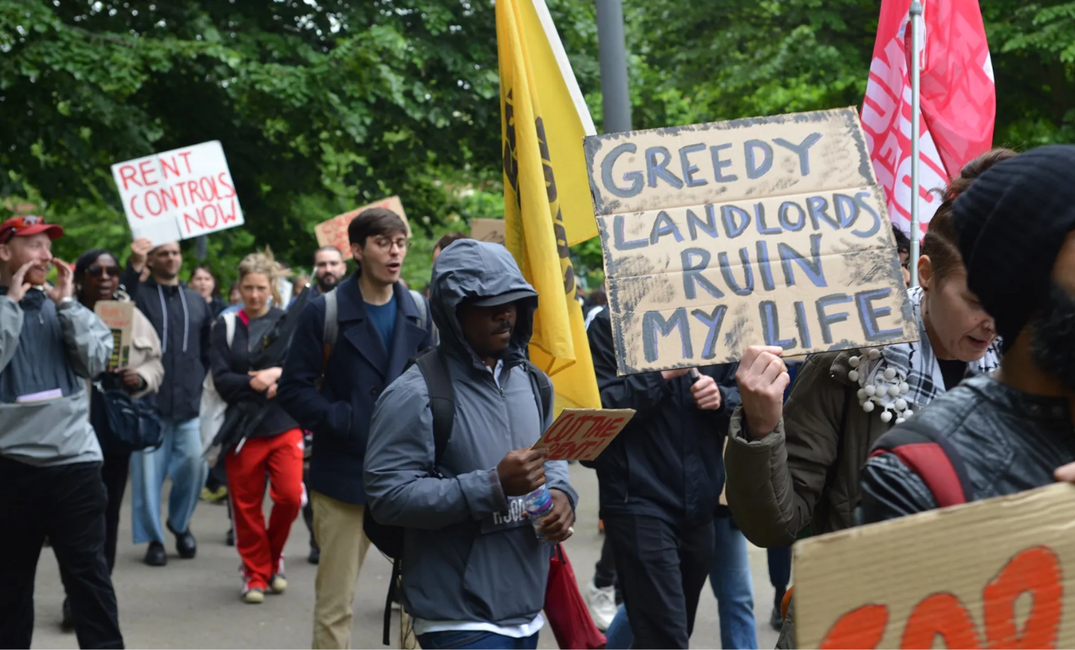Kara Leigh
The Renters Rights Bill promises to redress the balance of power between tenants and landlords. It could finally lead to a transformation of renting in the UK, abolishing Section 21, (no-fault evictions) and apply the Decent Homes Standard, as well as limiting rent increases. But progress is being stalled. The Shadow Housing Minister, Jane Scott recently met with landlords and estate agents to delay the Bill, by forcing debates on multiple amendments. Progress of the bill fell to the new Labour government after the 2024 general election.
The Decent Homes Standard
Private renters often face unsafe and unstable housing conditions despite paying unsustainable amounts of their income in rent every month. The Public Accounts Committee reported that in 2022, 589,000 privately rented properties posed ‘’a serious threat to the health and safety of renters’’.
When I moved to London, my flatmates and I experienced first-hand the issues the Renters Rights Bill promises to amend. Issues ranged from a leaking ceiling, mould and damp, and broken utilities including the boiler. The Renter’s Rights Bill would make these concerns unacceptable with the introduction of minimum standards for a condition of a property.
The Renters Bill proposes a database, allowing potential tenants to see if their landlord has breached the Decent Homes Standard, or left issues unresolved within their properties. As tenants, we are held to relentlessly high standards. Rent must be paid on time, and letting agents often carry out multiple checks during the tenancy to ensure you are taking care of the property. If a tenant pays rent late, withholds rent until repairs are carried out, or broken utilities replaced, you are at risk of losing your home.
An end to fixed term tenancies?
Currently, landlords are not fulfilling basic requests to make their properties safe and tenants cannot leave without suffering financial loss, making renting a stressful, dehumanising experience. The only way to move out of a privately rented property, under a fixed-term tenancy, is to replace yourself as a tenant.
The last thing you want to do is find someone to live in the property you feel to be unsafe and not a comfortable living environment, it also creates uncertainty as to move-out dates and when you can move into a new property which risks paying rent for two properties.
The Renters Rights Bill will end Fixed Term tenancies. The agreement will be periodic, a tenant can give two months' notice to leave, and a landlord cannot decide to move into their property, or sell in the first 12 months of a tenancy, unless to another landlord who will take over the tenancy. This will be a crucial step in empowering people to have control over their living situation.
Awaab’s Law
The Renters Rights Bill will extend Awaab’s Law to Privately rented homes. The law came into force for social housing in 2023 as part of The Social Housing Regulation Act.
Awaab Ishak died aged 2 as a result of a severe respiratory condition due to mould exposure Rochdale Boroughwide Housing failed to address. This law requires health hazards reported by tenants be repaired within a specific time frame. Landlords will have deadlines to arrange essential repairs and they will have to meet the Decent Homes Standard.
During Jane Scott’s meeting with the major landlords and estate agent groups, she expressed concern that landlords lack the organisation to meet strict timelines and deadlines to complete repairs, she agreed with the Conservative position not to extend Awaab’s Law to privately rented properties. This is a grave failure for renters across the country.
Fair for who?
When discussing human lives and safety, should the lack of organisation skills be an excuse for not carrying out your duties as a landlord? Often all our landlord was required to do was open emails, sign contracts, and approve of the letting agent's decision to arrange repairs, but we lived in a damp, mouldy environment for far too long, and this is a familiar experience for far too many, The English National Housing Survey reported around 904,000 homes in England had damp issues in 2021, 11% of these being privately rented, 4% in the social-rented sector, and 2% owner-occupied.
As the Bill enters the Committee stage, where it will receive line by line examination, many have expressed concern that the Bill will end up being weakened due to unelected peers in The House of Lords acting in self-interest. Anny Cullum from ACORN said the peers are ‘’acting in their own interests and attempting to weaken incoming protection for renters’ as reported in The i Paper.
It’s worth asking how fair it is to expect tenants to live in shocking conditions, feel dehumanised and have little recourse to justice when they experience inhumane housing conditions. Renting a property from a landlord is often a powerless experience, but one of the only options for young people as social housing availability continues to decline, and a deposit to buy a house feels increasingly out of reach. This Bill will make significant steps to provide greater balance and fairness in this relationship.
Thanks for reading our article! We know young people’s opinions matter and really appreciate everyone who reads us.
Give us a follow on Instagram and TikTok, and join our Whatsapp Channel to stay up to date with what young people think.

